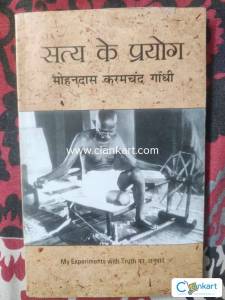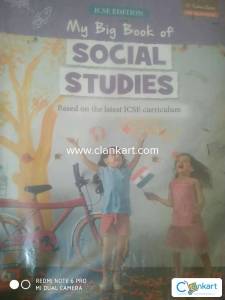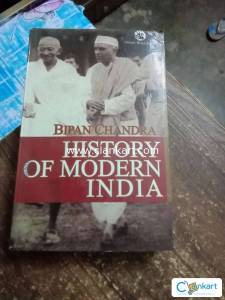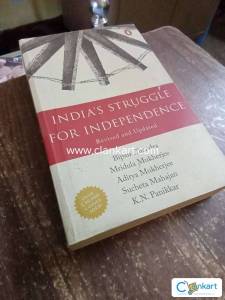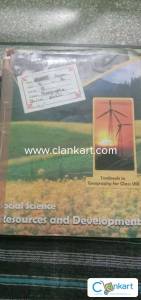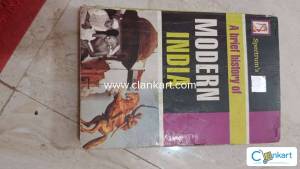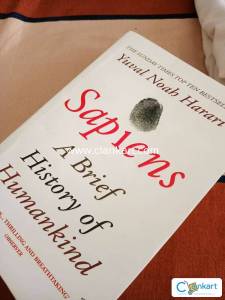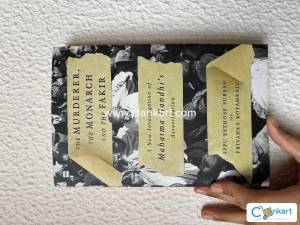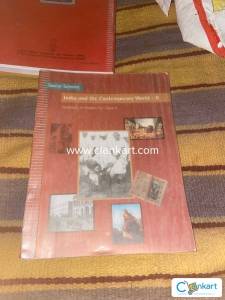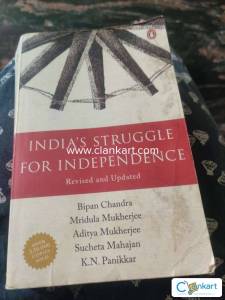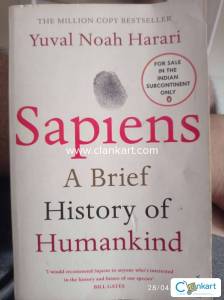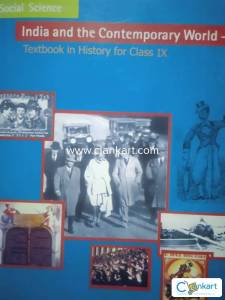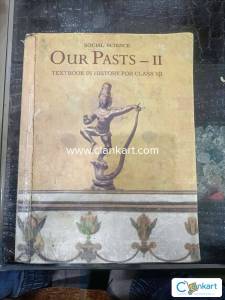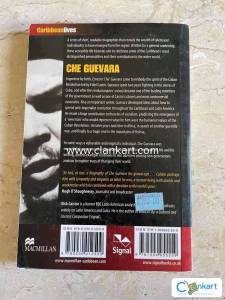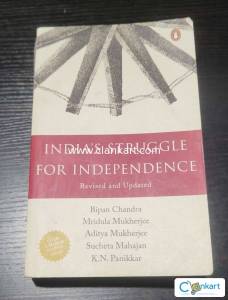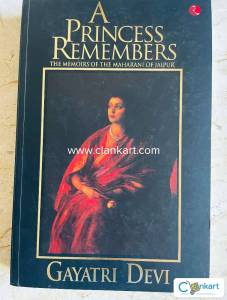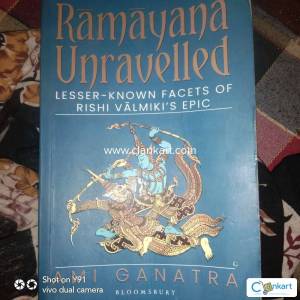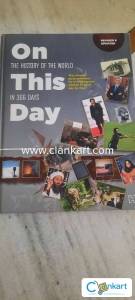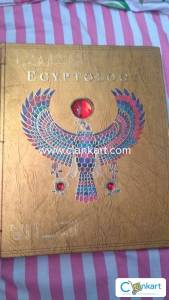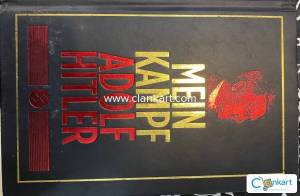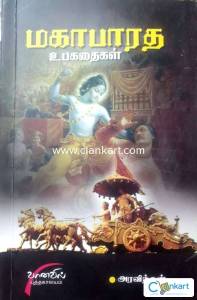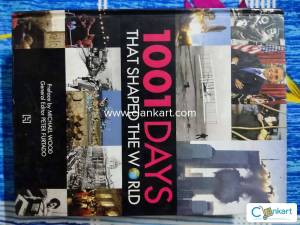Buy used History & Archaeology Books online in India
Buy Second Hand Books, Used Books Online In India
Autobiography of Mahatma Gandhi
Saty Ke Prayog is the autobiography of Mahatma Gandhiji. The book explains how India got indepence from British through Ahimsa (peace). I should indeed have finished the autobiography had I gone through my full term of imprisonment at Yeravda, for there was still a year left to complete the task, when I was discharged. Swami Anand has now repeated the proposal, and as I have finished the history of Satyagraha in South Africa, I am tempted to undertake the autobiography for Navajivan. The Swami wanted me to write it separately for publication as a book.
History of modern India
Published in the year 2009, History Of Modern India is a book that revolves around the history of British India, throwing light on the nationalist movement and colonialism. History Of Modern India is a book that is written by renowned historian, Bipan Chandra. The contents of this book are a result of Chandra’s research on the subjects of colonialism and nationalism in the country. Apart from his research, Chandra has also drawn from the works of renowned historians during that time in history.In total, there are 14 chapters in this book that cover different periods in Indian history. Some of the chapters in this book include Indian States And Society In The Eighteenth Century, Religious And Social Reform After 1858, The Struggle For Sawaraj, The Nationalist Movement, European Penetration And The British Conquest, Social And Cultural Awakening In The First Half Of The Nineteenth Century, The Decline Of The Mughal Empire, and The Revolt Of 1857. Some other chapters include The Nationalist Movement: 1858-1905, Administrative Changes After 1858, and Administrative Organisation And Society And Cultural Policy.This book doesn’t focus on the political factors during that period, but deals with the economic, religious, and social history of India. Through the course of this book, Chandra provides insight on several events in modern Indian history such as the establishment of the British East India Company, which led to a tightened grip of the British over India. Chandra also explains that the major reason behind the colonial rule was to exploit India by means of investment and trade. The chapters in this book are arranged in chronological order, starting from the British Rule to the independence of the country. This piece of literature provides its readers with loads of information on the nationalist movement, throwing light on the contributions made by several different individuals. This book is a must-have for history students as well as for those who want to gain insight into the history of modern India.
India's struggle for Independence
This is the first major study to examine every one of the varied strands of the epic struggle individually and collectively and present it in a new and coherent narrative and analytical framework. Basing themselves on oral and other primary sources and years of research, the authors take the reader through every step of the independence struggle from the abortive Revolt of 1857 to the final victory of 1947. More important while incorporating existing historiographical advances, the book evolves a new and lucid view of the history of the period which will endure.
Ncert geography for class 8th
Resource: The distribution of resources depends on various factors such as physical nature of the place. The physical factors include terrain, climate, height above sea level, etc. Since these factors vary in different parts of the world, resources are pot distributed over the earth.
History Of Modern India
Advent of the Europeans in India and the British consolidation of power in India besides incorporating additional information under several chapters. There are also chapters on the challenges that a newly independent nation faced in the wake of a brutal partition. The Nehruvian era is also briefly discussed. A survey of personalities associated with various movements, peasant and tribal movements, tables and charts are also given for quick reference.
The murderer, the monarch and the fakir.
The Murderer, the Monarch and the Fakir is a fresh account of one of the most controversial political assassinations in contemporary history-that of Mahatma Gandhi. Based on previously unseen intelligence reports and police records, this book recreates the circumstances of his murder, the events leading up to it and the investigation afterwards. In doing so, it unearths a conspiracy that runs far deeper than a hate crime and challenges the popular narrative about the assassination that has persisted for the past seventy years.The Murderer, the Monarch and the Fakir examines the potential role of princely states, hypermasculinity and a militant right-wing in the context of a nation that had just won her independence. It relies on investigative journalism and new evidence set in a strong academic framework to unpack the significance of this tumultuous event.
The Che Guevara
An accessible and well-researched biography that explores the life and ideas of an iconic revolutionary "At Last, at last, a biography of Che Guevara for grown-ups! Nick Caistor, well-known for years as a commentator on Latin America for the BBC, has produced a study of a man who is all too often treated either as a plaster saint incapable of doing wrong or as some devil from the deepest pit of Marxism-Leninism. Caistor portrays him with sympathy and elegance as what he was, a human being with doubts and weaknesses, which he combined with a devotion to the world's poor."Hugh O'Shaughnessy, journalistArgentine by birth, Ernesto "Che" Guevara came to embody the spirit of the Cuban revolution led by Fidel Castro. Guevara spent two years fighting in the sierras of Cuba, and after the revolutionaries' victory became one of the leading members of the government as well as one of Castro's closest and most controversial associates. Also an important writer, Guevara constantly developed ideas about how to spread anti-imperialist revolution throughout the Caribbean and Latin America.Guevara made a huge contribution to theories of socialism, predicting the emergence of a "new man" who would represent what for him were humanist values of the Cuban revolution. His later years took him to Africa, in search of another guerilla war, and finally to a tragic end in the mountains of Bolivia.Che Guevara was someone who showed few contradictions between his life and his writing, and his example continues to win admirers among new generations anxious to explore ways of changing their world.
A Princess Remembers
She is the daughter of the Maharaja of Cooch Behar and the widow of the Maharaja of Jaipur. She was raised in a sumptuous palace staffed with 500 servants and she shot her first panther when she was twelve. She has appeared on the lists of the world's most beautiful women. Gayatri Devi describes her carefree tomboy childhood; her secret six-year courtship with the dashing, internationally renowned polo player, Jai the Maharaja of Jaipur; and her marriage and entrance into the City Palace of the 'pink city' where she had to adjust to unfamiliar customs and life with his two wives. Jai's liberating influence, combined with Gayatri Devi's own strong character, took her well beyond the traditionally limited activities of a Maharani. This is an intimate look at the extraordinary life of one of the world's most fascinating women and an informal history of the princely states of India, from the height of the princes' power to their present state of de-recognition.
Ramayana unravelled by ami gantara
No epic has moved the consciousness of millions like the Ramayana. The appeal of the story of Rama is such that it has inspired the imagination of countless storytellers over the centuries, across the length and breadth of the subcontinent. From Jain poets to Bhavabhuti, from Kamban to Goswami Tulsidas, many have retold the Ramayana in their own language, infusing their own unique flavour.Though the story of Rama is much loved and well-known, questions prevail. Ramayana Unravelled attempts to address some key concerns: How did his childhood and youth shape Rama? Why did Rama agree to go on vanvas - was it only to obey his father or was there more to it? How was the relationship of Rama and Seeta? Is the Ramayana inherently misogynist, considering the characterisation of Seeta, Shurpanakha, Kaikeyi and Tara? What led to the downfall of Ravan?Ami Ganatra takes the reader through the events of the Ramayana, resolving conundrums and underlining the reasons the epic continues to be cherished to this day.
Egyptology
Discover the wonders of ancient Egypt through a fascinating journal from a lost expedition -- a treasure trove of fact and fantasy featuring a novelty element on every spread.Who can resist the allure of ancient Egypt -- and the thrill of uncovering mysteries that have lain hidden for thousands of years? Not the feisty Miss Emily Sands, who in 1926, four years after the discovery of King Tut's tomb, led an expedition up the Nile in search of the tomb of the god Osiris. Alas, Miss Sands and crew soon vanished into the desert, never to be seen again. But luckily, her keen observations live on in the form of a lovingly kept journal, full of drawings, photographs, booklets, foldout maps, postcards, and many other intriguing samples. Here are just a few of EGYPTOLOGY's special features:-- an extravagantly gilded cover, featuring a raised Horus hawk pendant with three encrusted gems-- a playable game of Senet -- ancient Egyptian checkers -- including board, pieces, original-style dice, and rules-- a souvenir booklet showing how to read simple hieroglyphs-- a scrap of textured "mummy cloth"-- a facsimile of the gilded mummy mask of King Tut-- a gilded eye-of-Horus amulet with a "jewel" at the endRich with information about life in ancient Egypt and peppered with Miss Sands's lively narration, EGYPTOLOGY concludes with a letter from the former Keeper of Antiquities at the British Museum, explaining which parts of this unique tale may be accepted as fact, which are guided by legend, and which reflect the author's delightful sense of fancy.
Mein Kampf
Alternate cover edition of this book.Madman, tyrant, animal—history has given Adolf Hitler many names. In Mein Kampf (My Struggle), often called the Nazi bible, Hitler describes his life, frustrations, ideals, and dreams. Born to an impoverished couple in a small town in Austria, the young Adolf grew up with the fervent desire to become a painter. The death of his parents and outright rejection from art schools in Vienna forced him into underpaid work as a laborer. During the First World War, Hitler served in the infantry and was decorated for bravery. After the war, he became actively involved with socialist political groups and quickly rose to power, establishing himself as Chairman of the National Socialist German Worker's party. In 1924, Hitler led a coalition of nationalist groups in a bid to overthrow the Bavarian government in Munich. The infamous Munich "Beer-hall putsch" was unsuccessful, and Hitler was arrested. During the nine months he was in prison, an embittered and frustrated Hitler dictated a personal manifesto to his loyal follower Rudolph Hess. He vented his sentiments against communism and the Jewish people in this document, which was to become Mein Kampf, the controversial book that is seen as the blue-print for Hitler's political and military campaign. In Mein Kampf, Hitler describes his strategy for rebuilding Germany and conquering Europe. It is a glimpse into the mind of a man who destabilized world peace and pursued the genocide now known as the Holocaust.
Mahabaratham
"Indian heritage and culture can be seen through the legendary epic pair – Ramayana and Mahabharata. The former culminated out of the lust for lady and the later for land. It is a herculean task to remember all the characters if you were to read either of these epics in one breathe. Would you like to board a time machine and take a sneak peak in to in to Mahabharata? Decipher the missing links in the form of small stories that will broaden your perspective And sharpen your axe with rich facts. Here you are. Your visa to travel back in time to the days of Mahabaratha! "
1001 Days - That Shaped the World
From the foundation of Rome on April 21, 753 B.C. to the Arab Spring of 2011, this newly updated edition of "1001 Days That Shaped the World "focuses on those truly pivotal moments that have changed the direction of world history. This page-turner of a book summarizes each event with a dramatic descriptive article and memorable illustrations and photos. Among the general categories of events described by historian Peter Furtado and his team of researchers and writers are decisive battles, major natural disasters, historic assassinations, the hatching of political plots, artistic and cultural milestones, and much more. Recent crucial events added in this new edition include-- The Deepwater Horizon oil platform explosion in the Gulf of Mexico, April 20,2010 The Japanese Tsunami on March 11, 2011 Osama bin Laden killed by a U.S. Special Operations military unit in Pakistan, on May 2, 2011 The Euro debt crisis of 2011 Here are stories of human achievement, high drama, and memorable tragedy, explained in terms of their physical, cultural, social, or economic impact on the world. Supplemented with hundreds of evocative photos and illustrations.

